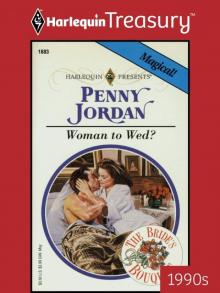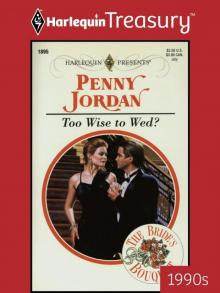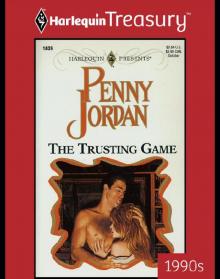- Home
- Penny Jordan
An Expert Teacher
An Expert Teacher Read online
v1.5
March 10, 2008
An Expert Teacher
Penny Jordan
'Luke, you didn't give me this job just to…?"
'Just to maneuver you into my bed, Gemma?" Luke taunted. "Not entirely, but I won't deny it was one of the deciding factors."
'But…" Gemma shook her head, shocked at Luke's unmasked desire.
'But what? But a man with my background shouldn't aspire to such heights, is that what you're trying to tell me, Gemma? That I'm not good enough to go to bed with?"
'Luke, you don't mean this," she protested. "You don't want me. You wouldn't even like…"
'What I'd like, lady, is to roll you on your back and make love to you until the only sounds coming from that soft mouth of yours are moans of pleasure."
Gemma shivered. It would be so easy to indulge in the pleasures Luke described—so easy to ignore his womanizing reputation.
* * *
contents
1 2 3 4 5 6 7 8 9 10
* * *
Harlequin Presents # 1153
Harlequin Presents first edition March 1989
ISBN 0-373-11153-3
Original hardcover edition published in 1987 by Mills & Boon Limited
Copyright © 1987 by Penny Jordan.
All rights reserved. Except for use in any review, the reproduction or utilization of this work in whole or in part in any form by any electronic, mechanical or other means, now known or hereafter invented, including xerography, photocopying and recording, or in any information storage or retrieval system, is forbidden without the permission of the publisher, Harlequin Enterprises Limited, 225 Duncan Mill Road, Don Mills, Ontario, Canada M3B 3K9.
All the characters in this book have no existence outside the imagination of the author and have no relation whatsoever to anyone bearing the same name or names. They are not even distantly inspired by any individual known or unknown to the author, and all incidents are pure invention.
Printed in U.S.A.
* * *
CHAPTER ONE
^ »
'Darling, it's so good to have you home. You can't imagine how much there is to do! Sophy's aunt hasn't the faintest idea of how to go about organising a large wedding, and so she's left absolutely everything to me.'
As always, implicit in her mother's welcome was the message that her love was conditional upon Gemma's performance in her unwanted role as daughter of the house. All through her years at boarding school and then later at college Gemma had heard that dual message. At one time she had even been hurt by it, wishing that her mother wanted her home purely because she loved and needed her. But with maturity had come the wisdom to accept her parents as they were.
It was not entirely her mother's fault that she held all real emotion at bay; first her parents and then her husband, Gemma's father, had actively encouraged her to be the pretty, silly, dependent woman she was.
In an era that encouraged women to think and live for themselves, her mother was something of an anachronism, Gemma recognised. At one time, just as she had ached for her mother's love, so she had also ached to see her assert herself as a human being, but now she could recognise what she had not been able to see then. Her mother had worked too hard and too long at being the wife her father wanted her to be to change now.
Her father did not want an independent woman as his wife, he did not want her mother to be able to meet him on his own level; he preferred to treat her as a pretty, dim-witted child, and Gemma had long ago recognised that that was their pattern of living and that to change it would mean that their relationship would end. It was when she had seen the futility of fighting against the feminine mould her parents wanted to cast her in that she herself had left home. She was not like her mother; she could never settle for the life her mother had led, always the inferior partner in a relationship that was totally opposed to everything that Gemma believed the relationship between a man and a woman should be.
She knew that both her parents were disappointed in her, in their different ways. Her mother had wanted her to be a carbon copy of herself: a daughter who would grow up to enjoy her love of shopping and lunches with her women friends; a daughter who would marry early, have two children, and make her home within easy reach of her parents.
Her father had wanted very much the same thing, with one qualification. First and foremost he had wanted her to be her 'daddy's girl' and he had been prepared to pay for the privilege with expensive presents and spoiling.
Gemma had learned enough about life and human nature now to feel saddened and sorry by the narrowness of her parents' lives and perceptions.
Other people viewed them differently, of course. Her father was an extremely successful businessman, and her parents were among the most wealthy inhabitants of the small Cheshire village where they lived.
David, her brother, was one of the directors of her father's building company. Unlike her, he seemed quite happy to fit into the mould their parents had designed for him.
Now David was getting married and it was his wedding that had brought her home. Luckily the date of the wedding fell right in the middle of her school's long summer holidays, so there had been no problem about her giving in to her mother's plea that she return to Marwich to help with the preparations for the big day.
She hadn't been surprised to learn that her mother was organising everything. No doubt her father had had a hand in that decision somewhere. She could just see him now, his rather austere face creased into a faint frown as he stood in front of the fireplace in his study, hands clasped behind his back in his favourite Prince Philip pose, whilst he suggested to David that it might be as well if their mother handled all the arrangements for the wedding.
She wondered rather wryly what Sophy Cadenham had thought of that decision. Gemma didn't know her brother's fiancée very well; for one thing Sophy was only twenty-one to her own twenty-five and, for another, both she and Sophy had spent all their teenage years away at their respective boarding schools. Sophy's schooling had been paid for by one of her more well-to-do relatives. Although an orphan, Sophy was what Gemma's mother described rather snobbishly as 'extremely well connected', which meant, Gemma reflected rather ruefully, that she was a cousin, once or twice removed, to the Lord Lieutenant of the County.
Both Gemma's parents were pleased about the match, and Sophy's aunt, a rather thin, tired-looking woman who had been widowed just about the same time that Sophy lost her parents, and who lived just outside the village in a pretty grace and favour house of Queen Anne origin, owned by 'Sophy's cousin, the Lord Lieutenant', had apparently been more than delighted to hand over total responsibility for organising the wedding to Gemma's mother.
Despite her rather vague and 'helpless little me' airs, Gemma's mother was a skilled organiser. Their house, the largest in the village with its extensive grounds, would make a perfect setting for a June wedding. The date had been decided when David and Sophy announced their engagement at Christmas, and now, with the big event only a week away, the hired gardeners were working tirelessly to bring the lawns and flowers to perfection.
A huge marquee was going to be erected in the grounds; Sophy's wedding dress, which had come from the Emanuels, was hanging upstairs in one of the guest room wardrobes, and the Lord Lieutenant and his lady had deigned to accept their invitation. In fact, the Lord Lieutenant had actually agreed to give Sophy away, much to her mother-in-law-to-be's delight.
The last thing her mother really wanted was her help, Gemma recognised, remembering ruefully down through the years how often she had heard the same plaintive sound in her mother's voice, and how often her childish heart had leapt with delight at the thought of being able to help her.
It had taken her a long time
to learn that her mother did not really want her help; that she didn't want anything from her, in fact, other than her pretty obedience. To her mother she was a toy to be shown off and paraded before her friends, not a human being at all. Just as David had been brought up as the son of the house, his father's heir, a proper manly little boy, so she had been brought up as a shy, pretty little girl.
Only she had broken free of that confining image to make her own life.
She came out of her reverie to hear her mother saying her name rather sharply.
'Gemma, you were miles away. I was telling you about the guest list. I want you to go through it for me, and help me with the table plan. The place cards will all have to be written out, too, by hand—typing them is so common.' She made a face, a pretty moue, that grated on Gemma, although she didn't let her feelings show.
'You're looking so tired, darling.' He mother's concern held a faint edge of bitterness. 'Daddy and I can't understand why you insist on working at that dreadful place. Daddy could have got you a job much closer to home at a far nicer school' She gave a tiny shudder of distaste. 'Some of those dreadful children you teach aren't even clean.'
Compressing her mouth against her mother's distaste, Gemma wondered what on earth her parents would say if she told them that she would ten times rather be with her unclean, ill-educated pupils than here in her parents' luxurious home.
Long ago she had decided that she wanted to teach; that had been something that was always there. Her desire to teach those who most needed the benefits that education could give, and who were least likely to receive them, had come later, growing gradually, and so far she had no regrets at all about her choice of career.
Of course there were heartaches and problems; days at a time when she ached for the sight of green fields and trees; weeks and months when she battled unsuccessfully against the oppressive weights of poverty and suspicion; nights when she lay awake, aching beyond sleep for the hopelessly narrow and deprived lives of her pupils. For some of them, from the moment they were born, the odds were stacked against them. It was her job, her private crusade, to offset those odds. When she had first arrived at the grey, depressed inner-city school the other teachers had warned her that she would soon lose her bright optimism, that she would be victimised and even physically abused by some of the children. She had been told she was too young and too pretty to teach the adolescent boys, many of whom could and did try to harass their female teachers. But even after three years of enduring all that Bower Street Comprehensive could throw at her she still held true to her original ideals. If she managed to open the gate that, via education, led to an escape from the grimness of his or her life for only one child, then she had achieved something.
This inner need to help and encourage these children wasn't something Gemma had ever discussed with anyone else. The other girls at the university with her hadn't shared her views on teaching, and her colleagues were often as ground down by the harshness of their surroundings, and the pressure of living in an area where so few of their pupils would ever be able to get even the most menial of jobs, as the pupils and their parents were.
'Gemma, you aren't listening to a word I'm saying.' Gemma looked up and saw that her mother was frowning at her. How different this pretty, floral sitting-room was to her own grim flat. This room was her mother's alone. It had french windows opening out on to a York stone-paved patio with tubs of flowers, beyond which stretched lawns, and trees. Her father had designed and built this house twenty years ago, with the proceeds from his first successful contract.
Since Christmas the whole house had been redecorated and refurbished in readiness for the wedding, Gemma thought wryly. Her mother's sitting-room, which she had last seen decorated in soft creams and pinks, was now all delicate yellows and french blues. A pretty floral fabric of a type often featured in glossy magazines hung at the windows and covered the plump settee. A huge bowl of yellow roses filled the marble fireplace, and the antique sofa table that her father had bought for her mother several years ago was covered in silver-framed photographs of the family. The entire ambience of the room was subtly expensive, faintly 'county', and Gemma stifled a faint sigh as she looked through the windows to the gardens beyond.
She missed this view more than she ever wanted to admit; she missed breathing clean, fresh air, and looking out on to green fields and tall trees. She knew that it wasn't possible for all people to be equal, and she also knew that her father had worked extremely hard to get where he was today. She didn't think it was wrong that her parents should have so much while others had so little, but she did think it was criminal that they should be so little aware, so little caring, of the reality of how other people lived.
Her mother had been shocked and disgusted on the only occasion she had visited her daughter in her small north Manchester flat, Gemma remembered. She had hated the narrow mean street, and the towering blocks of council flats; she had done everything she could to persuade Gemma to get another job, to come home and allow her father to use his influence to find her something more suitable, more acceptable to their friends, perhaps teaching small children at the local village school. Her father's company had a contract to build an extension on the local comprehensive and they had also given generously to the appeal to raise money for a swimming pool for the school, she was sure that…
Gemma had cut her off there. She didn't want to change her job, but trying to explain that, and to explain why, to her mother, had just been impossible.
'David and Sophy have gone round to the house. It really is lovely, Gemma. You must go and see it. Your father had it built for them as a wedding present. It's just a nice size for a young couple: four bedrooms and a pretty nursery suite. I do hope they won't wait too long before starting a family…'
Gemma let her mother chatter on as she tried to suppress her own growing feeling of alienation and tiredness.
'Of course your father had to invite him, but I was hoping that he wouldn't accept the invitation. He's not really one of our set, and if it wasn't for the fact that he and your father do business together, I wouldn't invite him here at all. It's amazing that he's done so well, when you think how he started, but I must confess that I never feel comfortable with him. The problem is that since he isn't married, where are we going to seat him?
'Businesswise, his company is now much bigger than your father's, and your father won't want to offend him, but he's hardly the sort of man one could put on the same table as the Lord Lieutenant, is he?'
Gemma frowned. 'I'm sorry, Mum, I missed half of that. Who are we talking about?'
'Oh, Gemma! Luke O'Rourke, of course.'
Luke O'Rourke. Gemma felt the room sway crazily round her, and she gripped hold of the chair back in front of her while her mother carried on, oblivious of her shock.
'Good heavens, you haven't met him yet, have you? I'd forgotten that. He was away at Christmas—I think he went to the Caribbean or somewhere on business—but you must have heard me mention him? He owns O'Rourke Construction—they practically built most of the latest stretch of motorway network round here. I'm not really quite sure how he and your father met, but over the last couple of years they've worked on several ventures together—those apartments your father's building in Spain, and the extension to the school. Luke is based in Chester.'
Gemma let her mother rattle on. Luke O'Rourke. It couldn't be the same man, surely? It had been stupid of her to be so shaken just because of the familiarity of the name. Luke O'Rourke. She closed her eyes unsteadily and then opened them again. It had all been so long ago. Over ten years ago now. She had been what… fourteen, almost fifteen? She shook her head, trying to dispel the images crowding her mind while her mother busily sought a way of dealing with the problem of where to seat Luke O'Rourke.
She could always seat him with Gemma, of course. Although she hated admitting it even to herself, Susan Parish found her daughter disturbing. Why on earth couldn't Gemma be more like the daughters of her friends, content to
marry a nice young man and settle down to be a wife and mother? And if she had to work, to teach, why did she have to work in that awful school with those dreadful children, half of whom couldn't even speak English? Whenever Gemma was around she was always on tenterhooks, terrified that she would upset her father, or make one of her dreadful sarcastic remarks. She wouldn't put it past Gemma to say something upsetting or controversial to the Lord Lieutenant, and she had been racking her brains for a way to avoid having the two of them together on the top table. As Sophy's closest male relative it was of course quite acceptable for him to be there, and even though Gemma had refused to be a bridesmaid, it would still have looked odd to have excluded her from the intimate family group. Now, though, she had the perfect excuse. Luke O'Rourke was definitely not 'family' but, as a 'close friend and her husband's business partner', it would be perfectly acceptable to pair him with Gemma, especially since she was not participating in the wedding as a bridesmaid. Breathing a tiny sigh of relief, Susan Parish went back to her mental arrangements, leaving Gemma totally unaware of what was going through her mind.
In the hall the grandfather clock chimed the hour. 'Oh, my goodness, I promised the vicar I'd see him this afternoon to discuss the final arrangements. Would you like to come with me, darling, or will you be all right here?'
The last thing Gemma felt like doing was joining her mother. Summoning a diplomatic smile, she shook her head.
'I'm afraid I'm feeling rather tired. Would you mind if I stayed here?'
Relieved, Susan Parish patted her hand. 'Of course not, darling. You are on holiday, after all. Oh, by the way, did I tell you that Daddy is bringing some people back for dinner tonight? Wear something pretty, won't you? You know how much Daddy likes to show off his pretty little girl.'

 Woman To Wed?
Woman To Wed? Wanting
Wanting The Trusting Game (Presents Plus)
The Trusting Game (Presents Plus) Too Wise To Wed?
Too Wise To Wed? Time for Trust
Time for Trust Out 0f The Night (HQR Presents)
Out 0f The Night (HQR Presents) Dangerous Interloper (Lessons Learned II Book 8; HQR Presents Classic)
Dangerous Interloper (Lessons Learned II Book 8; HQR Presents Classic) Best Man To Wed?
Best Man To Wed? They're Wed Again
They're Wed Again Out of the Night
Out of the Night An Innocent's Surrender
An Innocent's Surrender Marriage: To Claim His Twins
Marriage: To Claim His Twins Deal With the Devil--3 Book Box Set
Deal With the Devil--3 Book Box Set Matter of Trust
Matter of Trust Vacation with a Commanding Stranger
Vacation with a Commanding Stranger A Savage Adoration
A Savage Adoration The Mistress Purchase
The Mistress Purchase Reclaimed by the Ruthless Tycoon
Reclaimed by the Ruthless Tycoon The Tycoon's Forbidden Temptation
The Tycoon's Forbidden Temptation Sinful Nights: The Six-Month MarriageInjured InnocentLoving
Sinful Nights: The Six-Month MarriageInjured InnocentLoving Bedding His Virgin Mistress
Bedding His Virgin Mistress Escape from Desire
Escape from Desire Claiming His Shock Heir
Claiming His Shock Heir Stronger than Yearning
Stronger than Yearning Return of the Forbidden Tycoon
Return of the Forbidden Tycoon Mission: Make-Over
Mission: Make-Over The Garnett Marriage Pact
The Garnett Marriage Pact Wanting His Child
Wanting His Child A Little Seduction Omnibus
A Little Seduction Omnibus The City-Girl Bride
The City-Girl Bride Craving Her Boss's Touch
Craving Her Boss's Touch Starting Over
Starting Over Phantom Marriage
Phantom Marriage The Italian Duke's Virgin Mistress
The Italian Duke's Virgin Mistress One Night in His Arms
One Night in His Arms Force of Feeling
Force of Feeling Forbidden Loving
Forbidden Loving For Better for Worse
For Better for Worse Silver
Silver Rival Attractions & Innocent Secretary...Accidentally Pregnant
Rival Attractions & Innocent Secretary...Accidentally Pregnant A Bride for His Majesty s Pleasure
A Bride for His Majesty s Pleasure Desire's Captive
Desire's Captive Forgotten Passion
Forgotten Passion Taken Over
Taken Over Taken by the Sheikh
Taken by the Sheikh Sicilian Nights Omnibus
Sicilian Nights Omnibus Darker Side Of Desire
Darker Side Of Desire A Royal Bride at the Sheikh s Command
A Royal Bride at the Sheikh s Command The Ultimate Surrender
The Ultimate Surrender A Reason for Being
A Reason for Being A Cure for Love
A Cure for Love Bought with His Name & the Sicilian's Bought Bride
Bought with His Name & the Sicilian's Bought Bride Marriage Make-Up & an Heir to Bind Them
Marriage Make-Up & an Heir to Bind Them Bitter Betrayal
Bitter Betrayal Captive At The Sicilian Billionaire’s Command
Captive At The Sicilian Billionaire’s Command Valentine's Night
Valentine's Night The Convenient Lorimer Wife
The Convenient Lorimer Wife Reawakened by His Touch
Reawakened by His Touch Substitute Lover
Substitute Lover Passionate Protection
Passionate Protection The Hidden Years
The Hidden Years So Close and No Closer
So Close and No Closer Passion and the Prince
Passion and the Prince Virgin for the Billionaire's Taking
Virgin for the Billionaire's Taking Cruel Legacy
Cruel Legacy Payment in Love
Payment in Love The Wealthy Greek's Contract Wife
The Wealthy Greek's Contract Wife Penny Jordan Collection: Just One Night
Penny Jordan Collection: Just One Night Permission to Love
Permission to Love Beyond Compare
Beyond Compare When the Magnate Meets His Match
When the Magnate Meets His Match A Time to Dream
A Time to Dream Christmas Nights
Christmas Nights Christmas with Her Billionaire Boss
Christmas with Her Billionaire Boss The Sheikh's Baby Omnibus
The Sheikh's Baby Omnibus The Tycoon's Virgin
The Tycoon's Virgin Falcon's Prey
Falcon's Prey Mistress Of Convenience
Mistress Of Convenience The Perfect Father
The Perfect Father Stranger from the Past & Proof of Their Sin
Stranger from the Past & Proof of Their Sin A Little Revenge Omnibus
A Little Revenge Omnibus Loving
Loving Lesson to Learn
Lesson to Learn Second Chance with the Millionaire
Second Chance with the Millionaire Payment Due
Payment Due A Secret Disgrace
A Secret Disgrace Conveniently His Omnibus
Conveniently His Omnibus An Unforgettable Man
An Unforgettable Man The Tycoon She Shouldn't Crave
The Tycoon She Shouldn't Crave Pride & Consequence Omnibus
Pride & Consequence Omnibus The Dutiful Wife
The Dutiful Wife Bought With His Name
Bought With His Name The Friendship Barrier
The Friendship Barrier High Society
High Society The Price of Royal Duty
The Price of Royal Duty A Scandalous Inheritance
A Scandalous Inheritance At His Convenience Bundle
At His Convenience Bundle The Blackmail Baby
The Blackmail Baby Prince of the Desert
Prince of the Desert A Sudden Engagement & the Sicilian's Surprise Wife
A Sudden Engagement & the Sicilian's Surprise Wife Unexpected Pleasures
Unexpected Pleasures Levelling the Score
Levelling the Score Savage Atonement
Savage Atonement Dangerous Interloper
Dangerous Interloper A Passionate Awakening
A Passionate Awakening Ruthless Passion
Ruthless Passion Time Fuse
Time Fuse Past Passion
Past Passion Her One and Only
Her One and Only The Innocent's Secret Temptation
The Innocent's Secret Temptation A Stormy Spanish Summer
A Stormy Spanish Summer The Marriage Demand
The Marriage Demand Future King's Pregnant Mistress
Future King's Pregnant Mistress Unwanted Wedding
Unwanted Wedding Giselle's Choice
Giselle's Choice Now or Never
Now or Never Blackmailed by the Vengeful Tycoon
Blackmailed by the Vengeful Tycoon Lovers Touch
Lovers Touch Scandalous Seductions
Scandalous Seductions The Power of Vasilii
The Power of Vasilii Possessed by the Sheikh
Possessed by the Sheikh It Happened At Christmas (Anthology)
It Happened At Christmas (Anthology) The Perfect Lover
The Perfect Lover The Flawed Marriage
The Flawed Marriage The Greek's Runaway Bride
The Greek's Runaway Bride An Unbroken Marriage
An Unbroken Marriage Hired by the Playboy
Hired by the Playboy The Blackmail Marriage
The Blackmail Marriage Daughter of Hassan
Daughter of Hassan Campaign For Loving
Campaign For Loving The Boss's Marriage Arrangement
The Boss's Marriage Arrangement Seduced by the Powerful Boss
Seduced by the Powerful Boss Marriage Without Love & More Than a Convenient Marriage?
Marriage Without Love & More Than a Convenient Marriage? Bride in Name Only
Bride in Name Only Her Shock Pregnancy Secret
Her Shock Pregnancy Secret Propositioned in Paradise
Propositioned in Paradise The Only One
The Only One The Sicilian s Baby Bargain
The Sicilian s Baby Bargain The Trusting Game
The Trusting Game The Most Coveted Prize
The Most Coveted Prize One-Click Buy: September Harlequin Presents
One-Click Buy: September Harlequin Presents In Her Enemy's Bed
In Her Enemy's Bed An Expert Teacher
An Expert Teacher A Rekindled Passion
A Rekindled Passion The Reluctant Surrender
The Reluctant Surrender Shadow Marriage
Shadow Marriage A Scandalous Innocent
A Scandalous Innocent Forbidden Kisses with the Boss
Forbidden Kisses with the Boss Bound Together by a Baby
Bound Together by a Baby Second-Best Husband
Second-Best Husband Response
Response His Untouched Bride
His Untouched Bride A Kind of Madness
A Kind of Madness Past Loving
Past Loving His Blackmail Marriage Bargain
His Blackmail Marriage Bargain For One Night
For One Night Legally His Omnibus
Legally His Omnibus Back in the Marriage Bed
Back in the Marriage Bed Man-Hater
Man-Hater